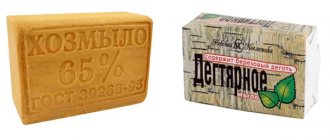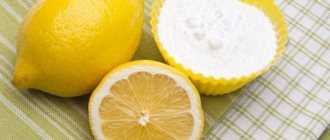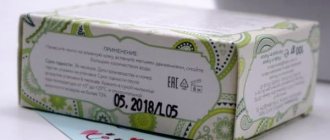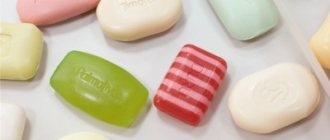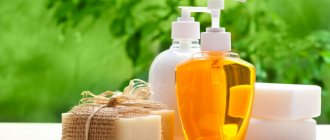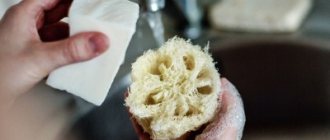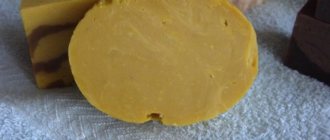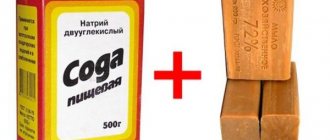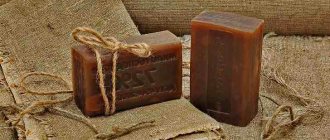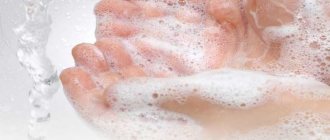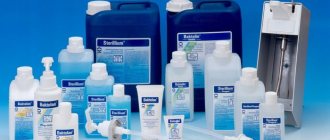The civilization of mankind has brought into life a lot of promising, useful, time- and cost-effective labor, however, not everything is so positive. Pessimism, of course, is also inappropriate. Our World is multifaceted, colorful, amazing and it is a pleasure to live in it, but everyone would like it to be longer and of better quality. To do this, it is advisable to have some available information.
A person eats every day, this is just as important as washing dishes after eating. The issue of the safety of detergents for this purpose has been discussed recently. People now have access to new knowledge that they would like to share.
Why people refuse some detergents
Stores sell a huge number of all kinds of gels, liquids and powders that can be used to wash any dishes. By applying just a little gel to a sponge, you can wash several greasy dishes at once. Detergents act quite effectively and quickly, so why give them up?
The reason is that many of them are poorly washed off from the surface of the dishes and enter our body along with food. As a result, substances that cause allergies, weaken the immune system, and become the cause of many diseases accumulate in the skin, blood and other human organs.
Surfactants contained in almost all detergents cause great harm to the body. They can increase the risk of infertility, harm the immune system, and increase cholesterol levels in the blood.
Phosphates are extremely harmful. Getting into the sewer system and then into the soil, they contribute to the proliferation of algae and the blooming of water bodies, which significantly worsens the condition of drinking water. And water, in case anyone has forgotten, is first taken from natural sources, and only then enters the water supply system.
Phosphates are also harmful because they enhance the effect of surfactants. In some countries, they are generally prohibited in the production of any detergents. Of course, you can wash dishes with gloves, as well as use dishwashers, but this does not save us from harmful components, since there is a circulation of substances in nature.
For conscious people, all these reasons are quite enough to look for an alternative to harmful substances. The solution could be:
- careful study of the composition and purchase of exclusively environmentally friendly detergents;
- the use of available harmless substances such as soda or mustard powder;
- Making your own detergents.
The first option is not acceptable to everyone in our country, since it is quite difficult to find harmless products. Let's talk about a safer product - laundry soap.
What are the dangers of dishwashing detergents?
In specialized departments of stores it is easy to find a variety of gels and powders designed for cleaning dishes after preparing and eating food. The advertisement says that one drop of the product can wash a whole stack of dirty dishes. If they are so effective, then what is the point of stopping their use? It turns out that the composition of such gels is far from beneficial for the human body, and not everyone knows how to properly wash off their residues from dishes. As a result, part of the chemical gets ingested with food, which affects the manifestation of allergies, decreased immunity and the occurrence of a number of pathologies.
Serious harm is caused by so-called surfactants (surfactants) - they increase the possibility of developing infertility and negatively affect a person’s immune system. In general, if you look at each of the elements of dishwashing detergent, it will become clear that they are very dangerous to health. Once you start studying this issue in detail, you will almost immediately want to exclude store-bought formulations from your regular household purchases.
How to use laundry soap
Dishes can be washed with laundry soap. For it to work effectively and rinse off well, you must use warm water. Some housewives complain that soap leaves streaks, whitish spots and even a greasy residue on the dishes. This often happens if the water is hard. You can fix the problem with baking soda. Remember how to properly wash dishes. This should be done not under the tap, but in a basin or bowl of water.
Fill a large bowl with warm water and add some baking soda to it. Wet and soap the sponge with laundry soap. Wash the dishes and then rinse them in running warm water.
This procedure will remove all contaminants. If there is a lot of fat left in the pan, it is better to wipe it off with a paper napkin or pour it into a bag and throw it in the trash. You cannot wash fat down the drain, as this leads to rapid clogging. Using huge amounts of detergent is impractical and harmful to us and to nature.
It happens that food is strongly stuck to the bottom of the pan. To deal with the problem, pour water into it, grate a little laundry soap or add baking soda and turn on the heat. After the water boils, leave it to cool. As a result, the burnt material will dissipate and you can easily clean the dishes.
Adviсe
The method of boiling with soap will help to wash off thick greasy layers from pots and pans . The shavings of half a bar of soap are dissolved in ten liters of water.
Dip very dirty dishes into the soap solution and boil them for thirty minutes. After this procedure, dense layers of fat and soot will easily come off the surface of pots and pans under the pressure of running water.
You should not buy white or light brown laundry soap for dishes. This product is enriched with a variety of chemical additives (for example, bleach) that are hazardous to human health.
Laundry soap dries out the skin very much. Rubber gloves will help protect your hands from irritation and peeling .
Composition of laundry soap
Why is laundry soap more acceptable, why can you wash your hands and dishes with it? It contains natural vegetable oils, animal fats and sodium hydroxide alkali. There are no phosphates in it. High-quality laundry soap must comply with GOST.
The components of laundry soap do not cause allergies and do not harm the environment; it has bactericidal properties. It is better to use yellowish-colored soap for dishes. The percentage of fatty acids in it (indicated as an extruded two-digit number) should be more than 64%, but the higher it is, the better the soap will be in terms of its cleaning properties. The maximum percentage according to Russian standards is 72%. During the production of soap, alkali and acids react to produce salts that have soapy properties. Thanks to this reaction, we can wash any thing.
White laundry soap is widely used. It has a more pleasant smell and a more aesthetically pleasing appearance, but before using it on dishes, it is better to clarify its composition. White soap is obtained as a result of bleaching and aromatization, that is, it contains various additives that are not always useful. This soap can be used to wash clothes and may have bleaching properties. For example, in white soap you can find the BHT component, which is a preservative, and its entry into the digestive tract is undesirable. This soap cannot be used for washing dishes.
Pros and cons of using soap gel
Products based on laundry soap have the following advantages:
are easily washed off from the surface of the dishes without leaving a toxic film;- have a natural composition and do not contain strong allergens;
- have antiseptic properties, suitable for everyday disinfection of household items and surfaces;
- are characterized by economical consumption and low cost;
- Due to the absence of chlorine, they do not harm the environment.
The disadvantages of laundry soap include the following aspects:
- the product dries out the skin greatly;
- in cold and hard water, soap foams worse, rinses off and dissolves fat (for example, whitish stains may remain on glassware);
- complex stains require preliminary soaking in a soap solution and the use of an abrasive.
The absence of aggressive surfactants, dyes and fragrances reduces the risk of allergic reactions, but does not completely eliminate it, so before using the product you need to test on a small area of skin.
Disadvantages of laundry soap
Laundry soap has its drawbacks. So, it contains a small percentage of insoluble substances, so after using it you must also rinse the dishes very carefully. It foams only in water with an alkaline reaction, so add soda to hard water.
The disadvantages include the fact that it dries out the skin very much. For women with delicate skin, this becomes a real problem, and they refuse to use soap. A way out of the situation may be to prepare a liquid composition with the addition of glycerin. Or you can wear gloves while washing dishes and lubricate your hands with cream.
Is it possible to wash dishes with laundry soap: pros and cons
You can use laundry soap for washing dishes , since it contains natural ingredients and does not contain phosphates or surfactants. Contains only vegetable oils and fatty acids of plant origin, sodium salts. This soap does not contain fragrances, preservatives or dyes.
Soapy water poured on the ground cannot harm the soil . In addition, allergy sufferers can use the laundry soap - it is hypoallergenic soap. At the same time, it effectively washes away dirt from dishes and has a bactericidal effect.
Laundry soap does a good job of removing grease and food debris . However, it does not lather well enough in cold water. To facilitate the process, remove any remaining fat using paper napkins. This avoids pipe blockages. It is difficult to rinse dishes after using this product. Problems also await those with hard water in their taps.
Important! To avoid stains and stains on dishes, wash the utensils in a basin with the addition of soda. Afterwards, rinse the plates thoroughly in warm water.
You can deal with stuck-on fat and food like this : fill a pot or frying pan with water and put it on the fire. Add soda and grated laundry soap. Bring the mixture to a boil and turn off. As the liquid cools, soot will also lag behind, which will become much easier to remove.
Obvious advantages of washing dishes with laundry soap:
- a natural composition that does not harm humans (experts advise using it when cleaning children’s dishes);
- hypoallergenic;
- environment protection.
Despite the significant advantages, replacing special products with simple laundry soap has disadvantages :
- does not lather well in hard water;
- poorly soluble substances in soap, mainly salts, are difficult to wash off from the surface, so stains and stains remain on the dishes.
- dries the skin (after washing it is recommended to apply moisturizer to your hands, and it is better to wash dishes with gloves).
Liquid soap recipe
If you are used to washing dishes with liquid detergents, then we suggest implementing the following recipe.
- Grate 25 grams of laundry soap.
- Add a little hot water to it and melt it in the microwave or in a water bath.
- Add hot water to half a liter or a little less.
- When the mixture has cooled, pour one large spoon of vodka and 4 large spoons of glycerin into it.
The result should be a homogeneous composition, which must be poured into a bottle with a dispenser and used to wash plates, spoons, forks and other utensils. When it finally cools down, it will become viscous, like a real gel. It will foam well, but the foam will easily wash off the dishes. Glycerin will prevent the skin of your hands from drying out.
Often mustard powder is added to the same composition, which helps fight fat more effectively. You can also add coffee grounds if desired. The grounds will serve as a scrub that will scrub off any remaining food stuck to the dishes. In addition, it adds a more pleasant smell to the composition. But if you don’t want dark spots left on your plates that you have to wash off, then you don’t have to use coffee at all. Instead, add 1-2 tablespoons of soda and get a fairly effective detergent.
If you want the composition to be thicker, then pour less water into it. Otherwise there are no restrictions. The concentration of individual components can be changed at your discretion. Some girls prefer to add a minimum of water, spread the thick mass into molds and make new, improved laundry soap.
How to do it yourself?
It’s possible to make dishwashing soap (in no way inferior in quality to store-bought products) with your own hands.
Algorithm of actions:
Rub 100 grams of soap (better than laundry soap), mix 6 tbsp. hot water. The shavings are stirred until completely dissolved (the process can be accelerated by slowly whisking the soap solution with a mixer).- The resulting gel is divided into three parts. Add 1 tbsp to one. dry mustard, in another - 2 tbsp. coffee grounds, in the third - 1 tbsp. castor oil.
- Each mass is poured into the prepared mold in layers. In the process of forming the bar, it is important to wait until one layer dries, and only after that pour out the next one (for better adhesion of the two masses, the dried surface is coated with alcohol).
The solidified block is removed and left to dry (about seven days) in a dark, dry place.
My conclusions
What is better: industrial products or a bar of our soap is up to you to decide. If you are one of the ardent opponents of laundry soap, use mustard powder, soda, vinegar or lemon. You will find a lot of recipes for a wide variety of homemade cleaning products in this article. And the dishes will shine!
It’s very interesting to know if anyone adheres to my friend’s philosophy, and how do you wash dishes? Comment, discuss, share the material with friends and subscribe to the blog!
Natalya Bryantseva
KidsChemistry is now on social networks. Join now! Google+, VKontakte, Odnoklassniki, Facebook, Twitter
Is there an alternative?
It's no surprise that people are thinking about alternative ways to wash their dishes. Will there be such a result if you wash dishes with laundry soap? Expert opinion boils down to the fact that this option is safer.
But if we take the situation in general, there are three ways to solve the problem:
- Buy detergents after carefully studying their composition.
- Use baking soda, mustard powder or soap.
- Make your own detergent.
Important! It turns out that purchasing environmentally friendly detergent in the store is not easy, and its cost is quite high. Therefore, you have to use improvised means. For example, laundry soap.
Other variations based on a mixture of soda and laundry soap
Depending on your preferences, soda paste can be improved by supplementing it with various additives:
- Add ten drops of any essential oil of your choice to the already prepared mixture. As a rule, it is lemon, jasmine or tea rose.
- Dissolve three tablespoons of mustard powder and 30 grams of ammonia in a glass of water. Add the resulting mixture to the soda paste. This will provide you with additional disinfection and, therefore, a better effect when washing dishes. Mix these ingredients only with the windows open.
The prepared pasta should be stored, as is customary, in tightly closed containers. It perfectly washes, cleans, disinfects and, in fact, copes with almost all types of contaminants. On top of everything else, its preparation does not require any special physical or material effort.
